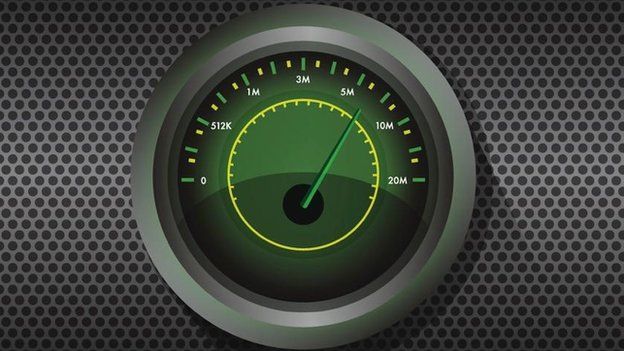Millions let down by broadband speed ads, says Which?
- Published

Up to three-quarters of UK households are still not getting the top broadband speeds promised by advertisements, according to consumer watchdog Which?
Up to 15.4 million households were paying for packages with advertised maximum speeds they would not achieve, a report suggests.
Ofcom has begun a broadband crackdown, making it easier for people to swap providers if they are unhappy with the speed of their service.
But Which? said more needed to be done.
Its tests also suggested that only 17% of homes were achieving the average advertised speed, with even fewer during peak evening times.
The problem was particularly bad in rural areas where 98% of homes were unable to get the advertised headline speed of the broadband service they had chosen.
"We want Ofcom to ensure consumers get the speeds promised by providers," said Which? executive director Richard Lloyd.
"It is not good enough that millions of homes are so poorly served by their broadband provider with speeds that just don't live up to what was advertised."
Ofcom said that it had recently drawn up a new code to ensure "people will be given clear, accurate information about their broadband speeds before they sign up".
And, it added, "customers have the right to walk away, without penalty, if speeds fall below an acceptable level".
"Ofcom regularly reports on the broadband speeds being delivered to UK homes, enabling people to compare providers, and we are committed to ensuring people have all the information they need to make choices that are right for them," a spokesperson for the regulator said.
Under current rules, internet service providers have to ensure that 10% of customers can achieve a top speed before they can advertise it as the maximum.
The research suggested that some packages could not even meet that low threshold.
Its tests indicated that only 4% of customers on TalkTalk's 17Mbps package were getting the top advertised speed and just 1% of those on BT's 76Mbps deals could achieve that speed.
'Headline claims'
The ISPs disputed these claims.
"Our data, based on over half a million customers, which far exceeds Which's base of a few hundred, shows that TalkTalk homes can achieve speeds beyond 17Mbps," said a TalkTalk spokesman.
"We're compliant with the advertising guidelines and if they change, we will continue to comply. Our network is faster and more resilient than ever and we continue to work hard to further increase broadband speeds."
Meanwhile BT said that more than 10% of its super-fast broadband customers could achieve speeds of 80Mbps or above.
"We're very clear that customers should not rely on headline claims, but instead use the personal speed quote we give them at the point of sale, which is based on their own line," it said in a statement.
"If they aren't happy with this personalised speed they can decide not to buy from us; if they are happy with the speed, but find they don't achieve it, we allow them to end their contracts in line with the Ofcom code of practice."
Sebastien Lahtinen, of broadband website ThinkBroadband, said it was difficult to provide one message for all.
"It can be very frustrating for consumers who buy an 'up to 76 meg' broadband service, only to find out they can only in fact receive a fraction of this speed," he said.
"The problem with marketing broadband services which are delivered over telephone lines is the service speed will depend on the quality of the line and without knowing your telephone number, a provider can't personalise this marketing message."
Publishing average speeds would "mislead those users who had better quality lines", he said.
The best thing that consumers could do was make sure that they got an estimate of the speeds they could expect from their supplier before they signed up to new packages, he added.
Which? wants Ofcom to work with the Advertising Standards Authority to ensure that broadband providers advertise only speeds that are available for the majority of their customers.
It also wants the watchdog to publish data annually showing what proportion of consumers receive the advertised speeds for the main broadband packages.
- Published11 June 2015
- Published12 June 2015